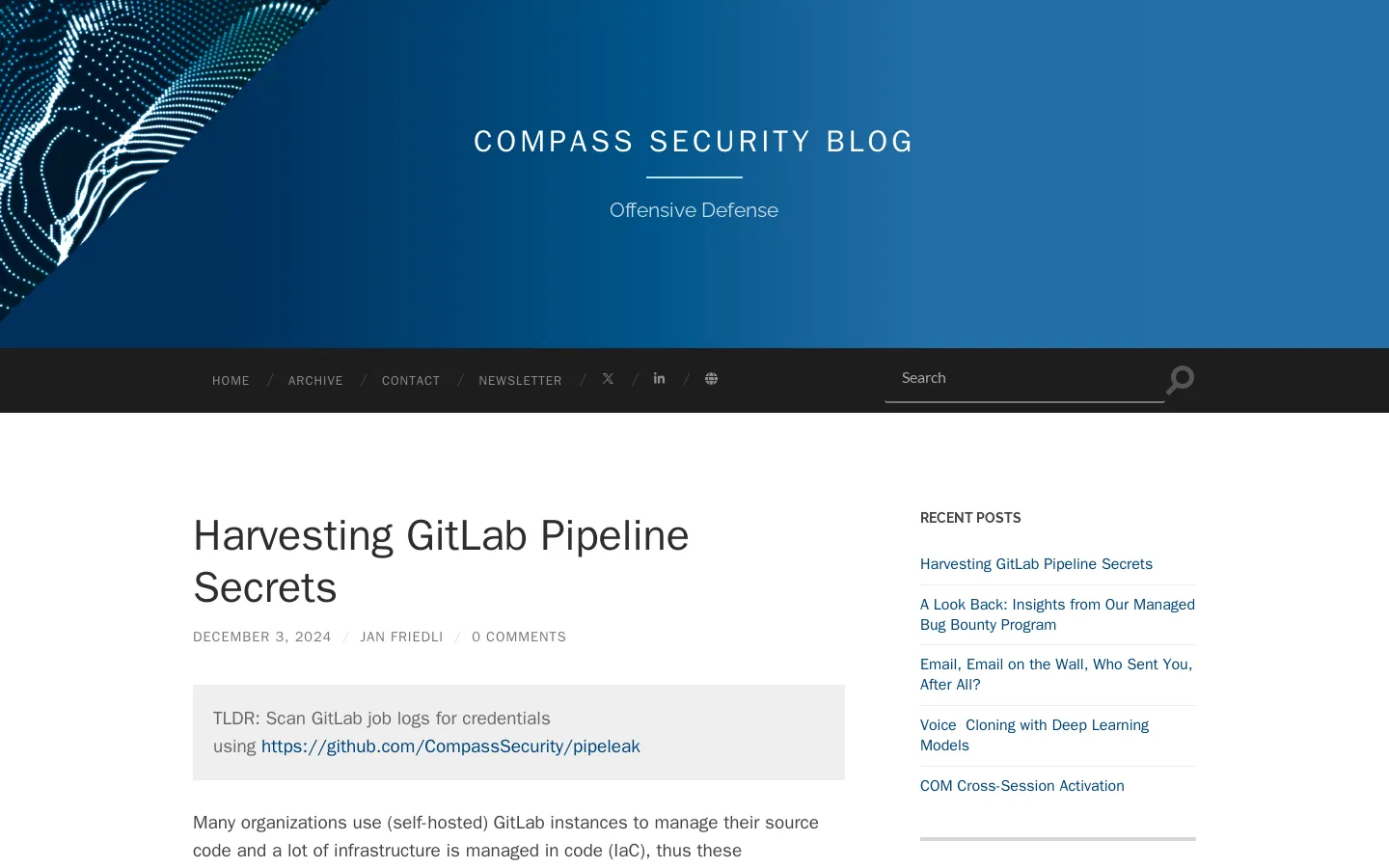
Enhancing Security in GitLab CI/CD Pipelines
/ 5 min read
Quick take - The article discusses the importance of implementing robust security measures in GitLab CI/CD pipelines, highlighting tools like Pipeleak for scanning job logs for sensitive information and recommending best practices for configuring secret variables to mitigate risks of data exposure.
Fast Facts
-
Importance of Security in CI/CD: As organizations increasingly use GitLab for source code management, securing CI/CD pipelines is critical to prevent exposure of sensitive information in job logs.
-
Use of Pipeleak: The Pipeleak tool is essential for scanning GitLab job logs to detect exposed credentials, helping teams identify vulnerabilities before they can be exploited.
-
Configuration of Secret Variables: Organizations should configure secret variables in GitLab CI/CD settings to be “Masked” or “Masked and hidden” to minimize the risk of sensitive data being visible in logs.
-
Avoiding Common Pitfalls: Teams must avoid logging sensitive values, ensure adequate variable masking, manage verbosity levels, and regularly review artifacts to prevent accidental credential exposure.
-
Integration of Security Tools: Utilizing tools like Pipeleak and integrating it with Trufflehog can enhance credential verification processes, improving overall security in CI/CD environments.
Enhancing Security in GitLab CI/CD Pipelines: A Comprehensive Guide
As organizations increasingly depend on GitLab for source code management and infrastructure as code (IaC), ensuring robust security within Continuous Integration/Continuous Deployment (CI/CD) pipelines has become a critical priority. Recent analyses underscore the importance of using tools like Pipeleak to scan job logs for sensitive information, highlighting the potential risks associated with improperly configured CI/CD environments.
The Growing Importance of GitLab in Development
GitLab has emerged as a popular platform that facilitates collaboration among developers and streamlines the software development process. However, the CI/CD pipelines within GitLab often generate logs that can inadvertently expose sensitive information, including credentials. Many organizations may not realize that these logs are frequently publicly accessible, raising concerns about data breaches and unauthorized access.
Mitigating Risks with Pipeleak
To mitigate these risks, it is crucial for organizations to utilize the Pipeleak tool, a resource designed to detect exposed credentials in GitLab job logs. This proactive approach allows teams to identify and rectify vulnerabilities before they can be exploited by malicious actors. By leveraging Pipeleak, businesses can protect themselves against potential security breaches and ensure that their development processes remain secure and efficient.
Configuring Secret Variables for Enhanced Security
In addition to using Pipeleak, organizations are encouraged to configure secret variables within the GitLab CI/CD Variables Settings. By setting the visibility of these variables to “Masked” or “Masked and hidden,” teams can significantly reduce the likelihood of sensitive information being visible in job logs. These security configurations are essential for safeguarding credentials and maintaining the integrity of the development environment.
Implementing masked and hidden variables provides an additional layer of protection for sensitive information. Furthermore, it’s important to protect these variables by setting the “Protect variable” flag. This measure restricts the export of sensitive variables to pipelines that run only on protected branches and tags, ensuring that your secrets remain safe from unauthorized access.
Best Practices for Logging and Verbosity Levels
When configuring your CI/CD processes, be mindful of logging practices. Avoid logging sensitive information in job outputs, particularly for debugging purposes, as this can inadvertently lead to credential leaks. Additionally, it’s wise to monitor the verbosity levels of the tools used within your CI/CD jobs. Regularly checking and adjusting these levels can help prevent the accidental logging of sensitive data, safeguarding your application’s integrity and security.
Common Pitfalls in Managing Secrets
Continuing from the previous discussion on managing secrets in GitLab CI/CD pipelines, it’s crucial to delve deeper into common mistakes or pitfalls that teams often encounter:
-
Logging Sensitive Values: It might be tempting to log these values for debugging purposes, but doing so can inadvertently expose credentials to anyone who has access to the logs.
-
Inadequate Variable Masking: Ensure all secret variables are configured to be “masked and hidden.” This setting helps prevent these secrets from being revealed in CI/CD settings or within job logs.
-
Excessive Verbosity Levels: Setting tools to a high debug verbosity level can lead to unintentional logging of sensitive information.
-
Artifact Review: Regularly reviewing generated artifacts is crucial to ensure that sensitive information does not remain exposed.
Leveraging Tools for Enhanced Security
Implementing Pipeleak can be transformative in identifying typical job misconfigurations that lead to credential leaks. Pipeleak automatically scans GitLab job logs and generated artifacts for sensitive information, streamlining the process of identifying leaked credentials.
Moreover, users can extend Pipeleak’s functionality by integrating it with Trufflehog, significantly improving credential verification processes. This integration ensures a comprehensive approach to safeguarding sensitive information throughout the CI/CD pipeline.
Recommended Tools and Resources
The tutorial emphasizes utilizing specific tools and resources to safeguard against potential threats:
-
GitLab Runners Enumeration: Offered by Pipeleak, this feature helps identify potential vulnerabilities in the CI/CD pipeline setup.
-
Vulnerability Checker: An additional feature of Pipeleak assesses the security posture by checking for known vulnerabilities.
Incorporating these tools into a robust security strategy can significantly enhance the overall integrity of CI/CD processes, ensuring that organizations not only build and deploy software efficiently but also securely.
By adopting these practices and leveraging available tools, organizations can better protect their CI/CD pipelines from potential breaches while maintaining trust in their software development practices.



